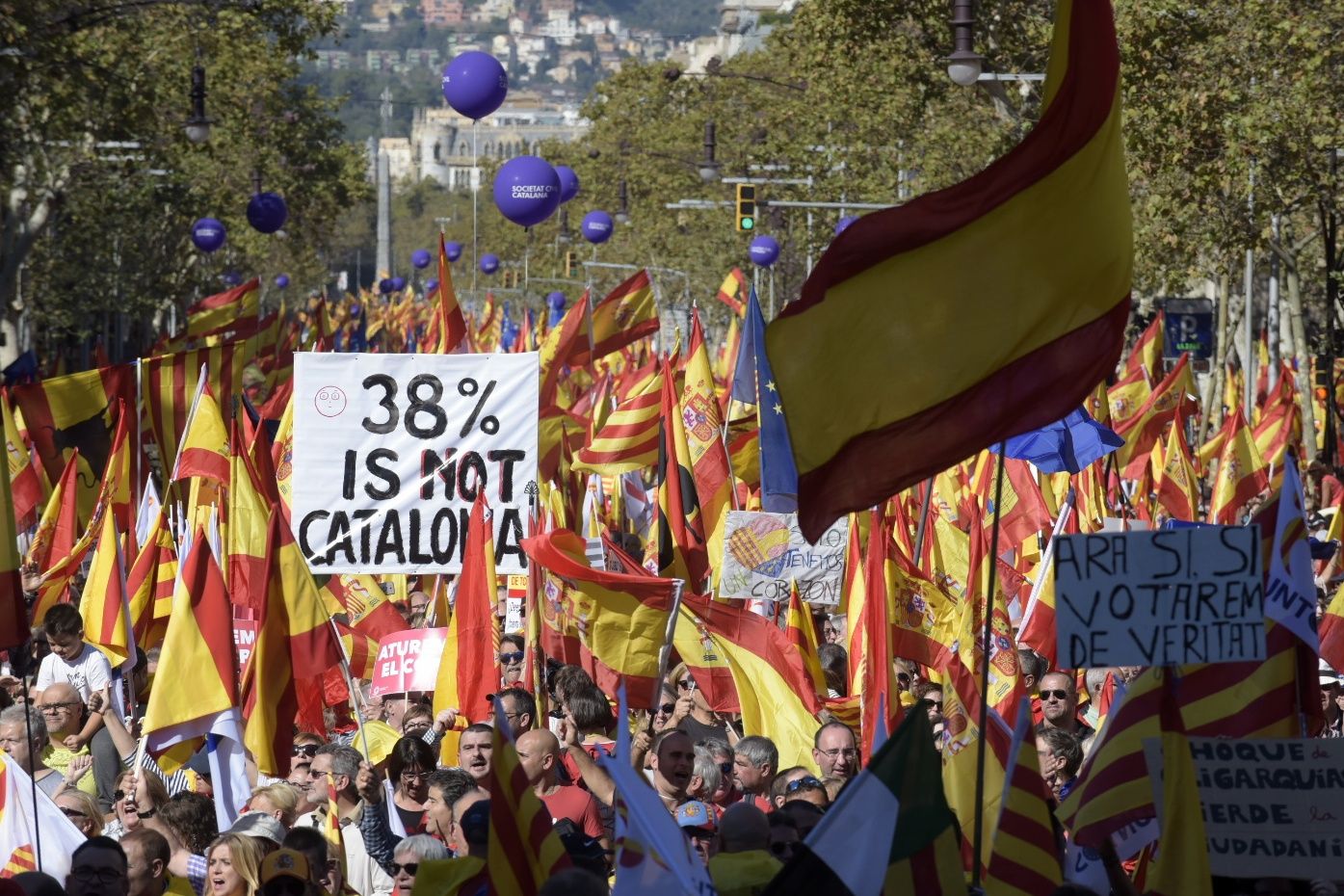It has become the most favoured chant among pro-Spain demonstrators since the October 1st referendum: “Puigdemont, to prison”. Two days after the approval of article 155 of the Spanish constitution under which Catalan self-government has been suspended, the many thousands of persons who gathered in Barcelona this Sunday chorused it again, as they marching under the slogan ‘We are All Catalonia’ in a protest called by the unionist group Catalan Civil Society. The setting chosen for the massive demonstration - the city's central Passeig de Gràcia boulevard - was exactly the same place as that selected last Saturday by the pro-independence grouping Table for Democracy to call for liberty for the imprisoned pro-independence leaders Jordi Cuixart and Jordi Sànchez and, indeed, to protest against Spain's adoption of article 155 itself.
The unionist organisers insisted when they called the march last Wednesday that its objective was not to defend article 155. However, the majority of those attending made clear their support for the takeover of the Catalan self-government institutions, by celebrating either the dismissal of president Puigdemont and his ministers (for whom prision terms are sought) or Mariano Rajoy's announcement of Spanish elections in Catalonia for the 21 December.
As always, there was a dance of figures on the size of the march. The organization quantified it at 1.3 million people, even though there was much more empty space than at last Saturday's demonstration in the same place. Barcelona city police gave a more modest figure of 300,000.
The political parties that favour continued union with Spain sent their leaders. Spain's governing Popular Party was represented by its Catalan leader Xavier Garcia Albiol, Spanish health minister Dolors Montserrat and the party's vice secretary Andrea Levy. The Citizens party sent its leaders at both Spanish and Catalan levels, Albert Rivera and Inés Arrimadas. The Catalan Socialist party opted for a higher profile than at the unionist demonstration of October 8th, and this time was led by the party's first secretary Miquel Iceta, first assistant secretary Núria Marín and organizational secretary Salvador Illa.
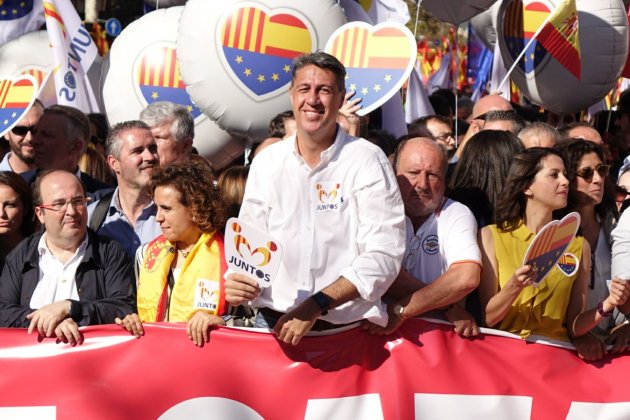
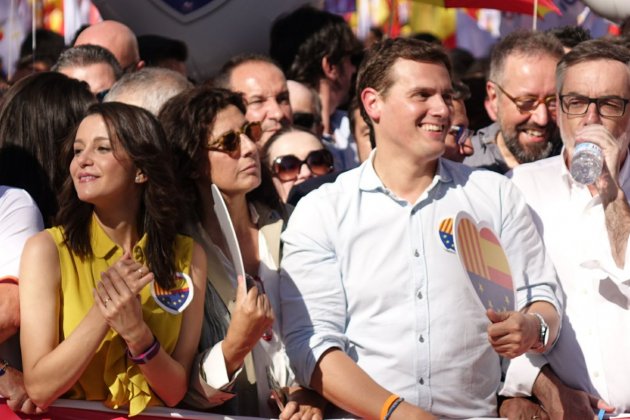
Roberto Lázaro
Among the recommendations made by the organisers was to “bring flags and symbols reflecting the spirit of the demonstration”. And the immense majority of demonstrators took this to heart. Among thousands of Spanish flags, many fewer Catalan senyeres and the odd European Union ensign, the marchers also carried placards directed against nationalism (of the Catalan variety). And also against the “fascist coup plotters”.
As well as calls of “Puigdemont, to prison” were others such as “Later you will say, there were few of us today”, “TV3, manipulative” or “I am Spanish, Spanish, Spanish”. Protesters also played on some of the chants used previously by the Catalan sovereignist movement, such as “Now, indeed, we shall vote”, referring to the elections called by Rajoy. The sound system installed by the organization played songs such as Manolo Escobar's "Viva España" and Joan Manuel Serrat's ‘Mediterráneo’.
As has become a tradition in these demonstrations, a helicopter made low circular passes over the crowd, to which the marchers responded with cries of “You are not alone” and “This is our police force”. On the other hand, when the Catalan Mossos' helicopter went over, it was jeered, and there were chants against the dismissed police chief Josep Lluís Trapero. Exactly the opposite to what occurred in the pro-independence marches.
"The secessionist has been defeated"
From the stage, located in the same position as for last weekend's march by independence supporters, speakers included Barcelona University professor and writer Félix Ovejero; constitutional law professors Francesc de Carreras and Teresa Freixes; the general former secretary of the Communist Party of Spain, Paco Frutos; ex-minister and ex-president of the Catalan PP, Josep Piqué, and the ex-president of the European Parliament, Josep Borrell, who had also taken part in the demonstration of 8th October. The president and vice president of Catalan Civil Society, Mariano Gomá and José Domingo, also spoke.
Josep Piqué made a call "to ensure that the future of Catalonia is not subject to coertion", and also to be ready for the elections called by Rajoy for December 21st.
“This is what makes us free and equal”, said Félix Ovejero, taking a copy of the Spanish Constitution out of his pocket. He delivered a strong criticism of nationalisms, while standing in front of thousands and thousands of flags. He said he was pleased that "the secessionist has been defeated.
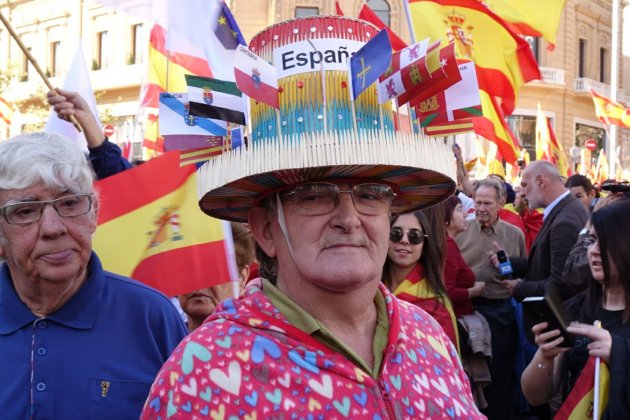
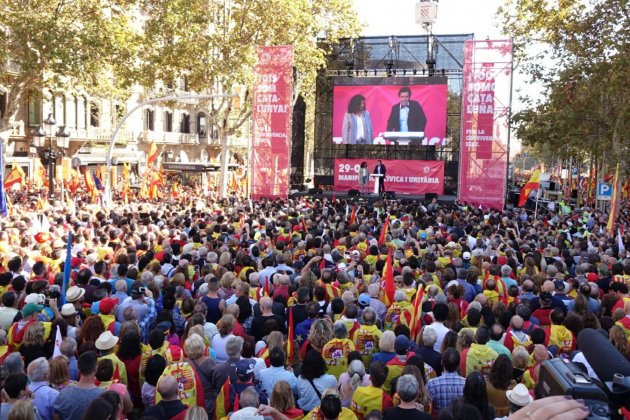 Roberto Lázaro
Roberto Lázaro
"I am here because I have heard Mr. Puigdemont saying once again that he speaks in the name of the people", assured Josep Borrell, being answered with shouts of "Puigdemont, to prison" and at times "Puigdemont, up against the wall". The former speaker of the European Parliament asked the crowd not to "lower yourselves to their level". However, he added: "I expect justice to soon fulfil its function and demand responsibilities". He attributed the electoral victories of independentism to high abstentionism by unionists. "Now we have a golden opportunity". He defended the application of article 155 "to restore legality" and reproached Barcelona mayor Ada Colau for her positioning.
Former communist leader Paco Frutos presented himself as a spokesperson for "the non-nationalist left”, and denounced that there is a part of the left which is, by contrast, nationalist. "I am portrayed as a traitor in the false comic strips that people have made up, in the identity-based racism that they have created, and it is because I will never justify any corruption, neither the type we have here or the type elsewhere", he asserted. He advised that "great nationalisms and small nationalisms destroy the world".
The event ended with the reading of a manifesto, denouncing "a rich Catalonia that turns its back on the less fortunate" and a "Catalonia of opposing forces" which need to be brought to an end. The manifesto claimed to speak for the "non-nationalists". The rally ended with Spanish and European anthems and the Catalan song Cant de la Senyera, which the organisers considered more representative than the Catalan national anthem Els Segadors.

